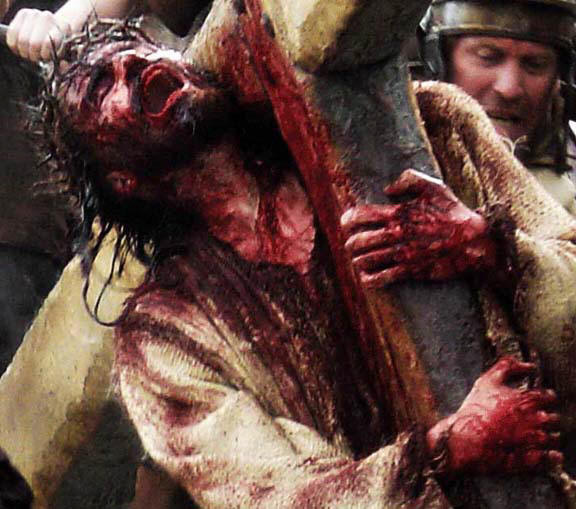| march 18, 2006 (0013us) intoxicating effect of cruelty |
|
It's
no use shedding tears over barbarity or thinking it is redemptive; what
is needed is changing the world (Revelation of Arès 28/7).
 I
had never seen "The Passion of Christ" by Mel Gilson. I had not
expected one more movie to alter the meaning of Jesus' horrific death:
Any individual proved able to persuade men to revise their subjections
is bound to risk death, physical or social, as long as prophethood does
not solve its real problem, which is not so much proclaiming as going
through human inertia. The movie has not changed the way I feel the
Passion, indeed, but in my brain it has opened a new window to it. A
few days ago, I went past the TV and sighted a scene of the movie:
Jesus being questioned by the high priest. I found the scene
particularly plausible, I sat down and stayed. Until the end — Some
pictures that do not tell anything new sometimes happen to boost your
consciousness. I
had never seen "The Passion of Christ" by Mel Gilson. I had not
expected one more movie to alter the meaning of Jesus' horrific death:
Any individual proved able to persuade men to revise their subjections
is bound to risk death, physical or social, as long as prophethood does
not solve its real problem, which is not so much proclaiming as going
through human inertia. The movie has not changed the way I feel the
Passion, indeed, but in my brain it has opened a new window to it. A
few days ago, I went past the TV and sighted a scene of the movie:
Jesus being questioned by the high priest. I found the scene
particularly plausible, I sat down and stayed. Until the end — Some
pictures that do not tell anything new sometimes happen to boost your
consciousness.I ignored the excesses of the movie: Mel Gibson should have asked professional torturers ' advice to get an exact notion of the bounds of human resistance (Jesus before ever dying on the cross would have already died twice when lashed by the two violent floggers in the movie, who eventually are nearly as exhausted as the flogged man; I was on the verge of laughing). Other scenes were far more interesting. Notably Pilatus as a perfect embodiment of a conscience able to discriminate between truth and untruth, but cowardly and failing to impose the truth. To me Pilatus is the key character of "The Passion": Human inertia. Once more I pondered the explosion that for millennia has sometimes occurred, when spiritual Truth, perpetually dynamic (here Jesus'), strikes the world's crude truth, perpetually inert, but enormous (here the clamoring mob's, the police force's, the dominating interests'). I had read paper reviews telling that "The Passion of Christ" was "nothing but a horror film, a picture more sensational than ethic or even aesthetic." I found it quite different. Apart from a few excesses (for instance, the flagellation or flogging, see above), through which Gibson might have intended to stress the contrast between innocent wisdom and stupid cruelty rather than horrify the audience, I can't see anything implausible in the brutality and contempt dogging Jesus from the beginning to the end of the movie. Isn't the intoxicating effect of cruelty and mockery still prevailing here and there in the world sick with evil? It's obvious that religion is not the remedy against evil. The remedy was given by the Sermon on the Hill (Matthew ch.5 to 7) . Later the world would be reminded of it through The Revelation of Ares: Man has to and is able to change his life for the better. This remedy has not yet been applied, because no human law is ever up to performing that sort of change. Only man's will is up to it. If Pilatus, the man in utmost authority, had willed to spare Jesus a useless atrocious torture, we can easily imagine that, had Jesus been set free and able to resume his mission, a lot of things would have changed in society from that time onwards. This in my eyes is the moral of the movie by Gibson: Some men, priests, Romans, do not know what to do with the prophet, whom they have to reproach for anything but being good and calling on mankind to join the kingdom of Goodness, shake off the problem through death, because they have not understood that the solution is plain: They have to turn good themselves. Here cruelty is just the intoxicating effect of barbarity, which is to last as long as mankind wants to stay barbarian.  |
| Post a comment |
|
00Xxx00 13usC1 Text Signature |